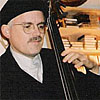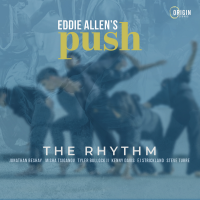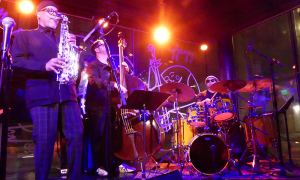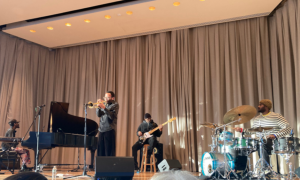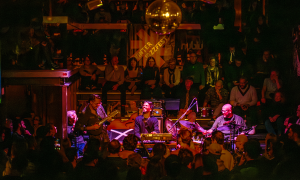Home » Jazz Articles » Live Review » Fly in La Jolla
Fly in La Jolla
Athenaeum Jazz at the Neurosciences Institute
La Jolla, California
April 18, 2009
It appeared an inauspicious venue for a jazz concert—a mile from Interstate Five in La Jolla, California, not in the village's quaint and stylish old sea-side downtown, but rather snugged in a tract of blocky and nondescript industrial type buildings housing a variety of bio-tech/research firms. But there at the Neurosciences Institute one finds a marvelous auditorium where, on April 18, 2009, Fly displayed their egalitarian chamber jazz.
The group is saxophonist Mark Turner, bassist FLY and drummer Jeff Ballard. Turner has recorded his CDs under his own name—Dharma Days, (WEA, 2001), and is something of a super sideman, sitting in on dozens of guest spots on a myriad of of recordings over the past decade. Ballard and Grenadier are best known for work in the Brad Mehldau Trio. But the Fly collective seems a special project for all three artists, as they toured to support their second CD, Sky and Country (ECM Records, 2009).
The trio opened the set with Ballard-penned "Lady B," with Turner displaying a beautiful tone in his tenor saxophone's upper register, while Ballard shifted rhythms from loose and free flowing to metronome-ish, machine-like precision, and Grenadier loped and rolled. "Stark" showcased the much written-about equality of input of the group—an especially rare aspect for a sax/bass/drum trio. Usually the sax plays the roll of the lead voice to his accompanists that get their chances to step out. The tunes featured duet sections and solos involving all, with Grenadier prowling with his elastic lines around Ballard's joyous percussion, Turner observing before he comes in comping with spare single notes placed perfectly.
It's all about the sound with Fly. Each instrumentalist searches and explores, melding, creating collectively something that sounds as if it exists in nature. Mark Turner's tenor sax is smooth, like Stan Getz's; but it's as if Getz had put aside the mainstream and Bossa Nova and gone out looking to find Nirvana with a couple of like-minded seekers.
There is a visual appeal to Fly. Turner is the priest, an aesthete, a man who appears immersed in the musically divine. Bassist Grenadier is the sensualist, ardently embracing and caressing his instrument, coaxing harmonious melodies and rhythms from it's feminine curves. And Ballard is the secular hedonist, full of a gregarious and orchestral joy of percussive creation.
On the tune "C.J," the group explored the atmospheric and amorphous ballad territory, evoking—more in concert than on the disc—a sense of deep meditation tinted, perhaps by a feeling of impending doom. The Turner-penned "Super Sister" was full of a gentle relentlessness, with Ballard switching from thoughtful grooves to studied exuberance.
Fly played a stellar show, mesmerizing an audience that seemed (from an unofficial, localized polling) unfamiliar with its work.
Tags
FLY
Live Reviews
Dan McClenaghan
United States
Mark Turner
Larry Grenadier
Jeff Ballard
brad mehldau
PREVIOUS / NEXT
Support All About Jazz
 All About Jazz has been a pillar of jazz since 1995, championing it as an art form and, more importantly, supporting the musicians who make it. Our enduring commitment has made "AAJ" one of the most culturally important websites of its kind, read by hundreds of thousands of fans, musicians and industry figures every month.
All About Jazz has been a pillar of jazz since 1995, championing it as an art form and, more importantly, supporting the musicians who make it. Our enduring commitment has made "AAJ" one of the most culturally important websites of its kind, read by hundreds of thousands of fans, musicians and industry figures every month.



